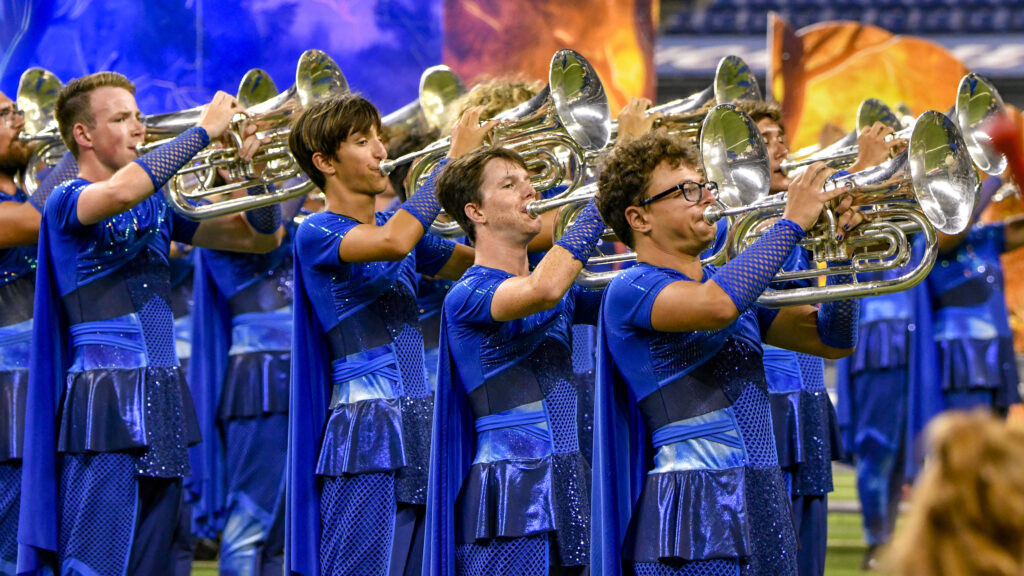On Jan. 25-28, instructors of Drum Corps International member corps and the DCI Board of Directors will meet in Atlanta to consider 10 new rules proposals. DCI.org columnist Michael Boo breaks down each of the items that will be considered and gives his insight and opinions on how passage of each rule might affect the direction of the drum corps activity.
The final part III of this series looks at four proposed rules for 2007 that deal with the allotted time for on-field corps warm-ups, changes to current membership limits, and possibly one of the more controversial of all 10 rules proposals; the allowance of electronic instruments in performances.
Extension of warm-up
The Cadets’ George Hopkins has introduced a proposal to change the way corps may warm-up on the field, if they so choose.
Under this proposal, warm-ups may begin any time after the two-minute entrance time and may continue (or not) up to the beginning of the corps’ production. Corps would still only have five minutes to set up before the judged performance begins.
The logic is that there is currently much confusion about what a warm-up is and what is allowed. This proposal would eliminate the confusion as well as potential penalties, and it seems to open the door for corps to do whatever they want during that time to set a mood for the show to come.
It is likely there will be discussion in Atlanta about how “open” this time frame would be to things we can and can’t yet imagine happening prior to a show. Hopkins mentions that the audience impact would be manifested in having less “dead time” from corps to corps if a corps chooses to take advantage of that time and that there is no judging involved. In fact, the transition from warm-up to show might even be more clearly defined.
If this passes, some corps’ creative staffs might take a “wait and see” attitude about the extended warm-up time. However, audience reactions to the new “mini shows within the show” might well stimulate more (if not all corps) to explore this time frame and come up with something to get people’s attention focused on their corps even before the show begins. In addition, fans may be less likely to leave their seats between corps because they won’t want to miss anything happening on the field.
Read the entire proposal (PDF).Prop persons not included in membership limit:
George Hopkins has mentioned the possibility that “as corps add more props, there is a chance that some of these fixtures need to be moved from place to place.” His proposal is to allow for “prop” people, not in uniform and not performing, be allowed to assist in a production and not be counted in a corps’ overall total members. This would allow performers to do what they do best—perform.
The proposal does not mention whether the “prop folks” could be of any age, something that would likely be raised if this proposal were to proceed to a vote.
Read the entire proposal (PDF).
Raise membership limit to 150:
George Hopkins has proposed that the number limit for members in Division I corps be raised from 135 to 150, effective for the 2008 season. This would allow for more participants, larger brass lines and color guards, and additional effects.
He points out that buses now have 55 seats and some of those are empty with the current membership limits. This would also allow for a greater balance between the different ensembles—a larger brass line wouldn’t mean the necessity to have a smaller guard—and vice-versa.
Additional members could be transported and fed with little additional costs. Consequently, membership dues from these additional members would amount to overall corps savings in the long run.
From an audience perspective, one might not notice that corps would be larger, but one would likely audibly feel and visually sense the difference.
The other side of this proposal is “The Rule of 150,” something one can read quite a bit about on the Internet and the reasoning some are currently giving for not letting drum corps get too big. In essence, the rule states that groups under 150 members operated better as a single social network, without factions that can rip apart the dynamic. To read more about this concept, check out the following links:
www.benjaminsternke.typepad.com
Read the entire proposal (PDF).
Inclusion of electronics in performances:
If you thought the debate over amplification was intense, well, that may have been just a warm-up to what might transpire when word of this proposal spreads.
George Hopkins has proposed that starting with this coming summer, electronic instruments can be utilized in any DCI-sanctioned performance. But let’s get one thing out of the way right now: All instruments would have to be played in real time, meaning that one “stroke” would equal one “response.”
And yes, sampling would be allowed. That will certainly inspire discussion as to what samples are allowable if the door isn’t just thrown open to sampling in its entirety. And due to recent developments in the recording industry, there might well also be concerns raised about the rules being explicit in disallowing sounds that might be copyrighted.
This would open the door to include synthesizers and drum machines. For example, one could hear the peal of church bells in something like “Overture 1812,” the ringing of a telephone, or a walking bass figure in a jazz classic. But actual instruments (such as woodwinds and strings) that are currently not legal would not be made legal under this proposal.
Hopkins has long been an advocate of using resources that are available to the larger creative community, and this follows up on that. He points out that some might not like what has occurred in the use of amplification, but we’ve opened the door to new ideas and approaches in allowing for amplification.
Many will regard the addition of synthesizers and electronics as just another pit development, being comfortable with witnessing such instruments on the marching band field for several years now. Their attitude might be coalesced in the opinion that “drum corps is whatever drum corps becomes.” Those who consider themselves more as purists in nature may regard this proposal as a step in removing another vestige of what makes drum corps unique.
Let the Internet discussions begin!
Read the entire proposal (PDF).
Other Michael Boo columns on the 2007 rules proposals:

Michael Boo was a member of the Cavaliers from 1975-1977. He has written about the drum corps activity for more than a quarter century and serves as a staff writer for various Drum Corps International print and Web projects. Boo has written for numerous other publications and has published an honors-winning book on the history of figure skating. As an accomplished composer, Boo holds a bachelor’s degree in music education and a master’s degree in music theory and composition. He resides in Chesterton, Ind.









